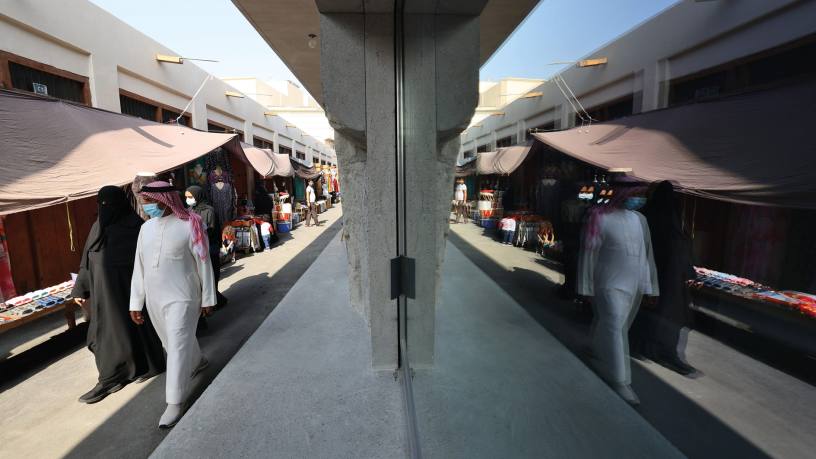The Bahraini economy had a difficult year in 2020, hit by the dual challenges of the global coronavirus pandemic and the low oil price environment. As a result, the country’s gross domestic product (GDP) is estimated to have shrunk by more than 5%, with sectors such as tourism and real estate hit especially hard.
In August, Fitch Ratings downgraded Bahrain’s long-term foreign-currency issuer default rating from BB– to B+, with a stable outlook reflecting the combined impact of lower oil prices and the pandemic.
To counter the economic impact, Bahraini authorities have pushed through support measures that include a freeze on bank loan repayments for all businesses and individuals. These were first introduced in March 2020 and will now run until at least June 2021.
“Support has been massive, and has been directed to ensure that the economy continues, that spending continues and that projects continue. Now we need to manage the end of the programme,” says Jean-Christophe Durand, chief executive of National Bank of Bahrain (NBB).
Deficit rising
Despite efforts to diversify, Bahrain’s economy is still heavily reliant on income from hydrocarbons, which makes up the bulk of state revenue. Max McGraw, a sovereign credit analyst at S&P Global Ratings based in Dubai, says: “Even though it’s relatively well diversified for the region, with less than 20% of the economy directly dependent on oil, lower oil prices reduced consumption and investment activities on the island.” At the same time, “the government is not efficient at collecting revenue from the non-oil economy and that’s something they’re working on,” he adds.
Strenuous efforts have been made in recent years to reduce the size of Bahrain’s budget deficit, and the government has been making significant progress in its fiscal balance programme, with the state budget deficit shrinking 25% in 2019. However, the pandemic has reversed those gains, at least in the short term.
“There was an increase in expenditure from some of the fiscal stimulus measures. Overall expenditure did go up in 2020 compared to 2019, increasing the deficit to our current estimate of about 13% of GDP in 2020, up from about 5% in 2019,” says Mr McGraw.
For the fiscal years 2021–2022, the Bahraini government is targeting revenue of BD4.6bn ($12.2bn), based on a price of $45 per barrel on the global oil markets. However, the budget deficit is expected to hit $3.4bn in 2021 and $3bn in 2022, after doubling to an estimated $4.4bn in 2020. The country also has $5.6bn of external debt maturing between 2021 and 2023.
In the first three quarters of 2020, there was a drop in the total assets of Islamic banks in Bahrain, explained primarily by a drop in the external funding
Bahrain turned to the capital markets twice in 2020, raising $2bn in both May and September, as it looked to offset falling revenue caused by low oil prices and the coronavirus crisis. The country raised a further $2bn in January 2021.
At the same time, Bahrain continues to receive funding as part of the $10bn long-term interest-free support programme agreed with Saudi Arabia, the United Arab Emirates (UAE) and Kuwait in 2018. The money is being released in tranches until 2023 and is unlikely to be affected by the current economic situation.
“We think that the larger economies in the region do have a propensity to support Bahrain, and will continue to support Bahrain,” says Mr McGraw.
Banking sector stable
The financial services sector remains the largest contributor to GDP in Bahrain outside of the oil sector, contributing roughly 17.2% of GDP as of September 2020.
According to the Central Bank of Bahrain (CBB), the country’s banking sector had total assets of $207bn as of September 2020, an increase of 1.5% in the first three quarters of 2020.
“Despite the continuation of difficult operating environments, the fundamentals of the Bahrain banking sector remain strong and are expected to bounce back with improvements in the macroeconomic conditions,” says Adel El-Labban, chief executive and managing director of Ahli United Bank (AUB), which saw its net profits fall by 26.7% in the first nine months of 2020.
Bahraini banks have fared satisfactorily over the past year, with loan growth and healthy assets quality, says Waheed Al Qassim, chief executive of the Bahrain Association of Banks (BAB). He points to the fact that while banking sector revenue decreased, the capital adequacy ratio remained at a healthy 18.6% at the end of the third quarter, with the loan to deposit ratio at 71% and non-performing loans (NPLs) at 4.6%.
“Additionally, with an improved economic growth to 2.9% in 2021, driven by improved oil prices and recovery of non-oil sectors, loan growth is expected to pick up further, underpinned by continued growth in the businesses,” he says.
The loan portfolio of Bahraini banks saw an uptick in the third quarter, with personal loans growing by 5.6% and business loans up 4% since February, the CBB reported in December.
“Our expectation for loan growth for 2021 is about 2%,” says Redmond Ramsdale, senior director and head of Middle East bank ratings, financial institutions, at Fitch Ratings. “It’s modest, but there is growth. Real GDP growth will be something like 5% for 2021, and that’s off the back of a contraction in 2020 of about 5.5%. That should bring business revenue opportunities for the banks.”
Looking ahead
Over the past year, banks have been particularly affected by the reduction in benchmark interest rates, with the CBB following the lead of the US Federal Reserve in cutting key interest rates. This resulted in a reduction of 75 basis points (bps) in March 2020.
For most banks, says Sael Al Waary, deputy chief executive of Bank ABC, the chief concern throughout 2021 will be credit losses of a magnitude not seen in decades.
“But soon after, banks will start worrying about revenue growth, which will be held back by a sustained low interest rate environment on the back of huge government stimulus unleashed during the Covid-19 crisis,” he says.
Mr Al Waary suggests that banks focused on finding new profit growth will likely need to deploy a range of measures, including productivity improvements, stronger risk management and better management of equity capital.
Digital push
One area that will aid the financial services sector in Bahrain is efforts in recent years to become a regional hub for digital banking and fintech.
“We started the journey through introducing a regulatory sandbox a few years ago. It was one of the best things that we’ve done, because it’s kind of fast-tracked the innovation process,” says Dalal Buhejji, director of business development, financial services, at Bahrain Economic Development Board.
In October, the CBB launched the country’s open banking framework, in line with its commitment to encourage innovation in financial services. It also launched the first comprehensive fintech laboratory in the region, FinHub 973, as part of efforts to establish a collaborative fintech ecosystem. The initiative is being regulated by the central bank.
Ms Buhejji suggests that while the pandemic has put an economic and healthcare burden on countries around the world, it has accelerated consumer adoption of digital offerings for the banking sector. “We had all the infrastructure ... and regulations in place,” she says, adding that previously, consumers felt like they had the option to use digital offerings — now they do not.
In October, electronic real-time fund transfers in Bahrain jumped seven-fold, according to the CBB, indicating increasing adoption of digital banking in Bahrain. The country is also pushing the full adoption of digital payments, with the receipt of physical cash payments already halted for 34 governmental services.
However, people still consider key developments, such as open banking, as a work in progress.
“[Open banking] is something that is good for the market, once everyone is on the same page,” says Mr Durand. “Some banks were compliant on time, some took the extra step of adding an aggregator, but I think the vast majority were not really there. The effects of open banking are not yet felt enough.”
Islamic finance hub
While growing as a fintech hub, Bahrain continues to lead the region on Islamic finance, ranking third globally according to the latest annual Islamic Finance Development Indicator. Between 2000 and September 2020, Islamic banking assets in Bahrain increased from $1.9bn to $31.4bn, with its share of the total banking sector increasing from 1.8% of total banking assets to 15.3% in September 2020.
Even so, the Islamic banking sector has also been impacted by the pandemic.
Bahrain continues to receive funding as part of the $10bn long-term interest-free support programme agreed with Saudi Arabia, the United Arab Emirates (UAE) and Kuwait in 2018
“In the first three quarters of 2020, there was a drop in the total assets of Islamic banks in Bahrain, explained primarily by a drop in the external funding,” says Mohamed Damak, global head of Islamic finance at S&P Global Ratings.
“But if you look at the loan portfolio, or the investments of Islamic banks, they’ve been pretty stable. Overall, there was a drop of 2.1% of total assets.”
Buying banks
Bahrain’s banking sector has seen some notable mergers and acquisitions in the past 15 months.
In January 2021, Bank ABC completed its purchase of the Egyptian subsidiary of Lebanon’s Blom Bank for $480m, subject to regulatory approval. The bank had listed assets of $2.88bn as of September 2020. This came a year after NBB raised its stake in Bahrain Islamic Bank from 29% to 78.8%.
“What Covid has revealed, in hindsight, is this acquisition was good for the country as a marketplace. Hopefully, this paves the way for future, similar types of transactions,” says Mr Durand. “Islamic banking is growing fast. Our clients are asking for Islamic banking services,” he says, adding that it is also fundamental to their operations in Saudi Arabia.
However, one significant merger involving a Bahraini lender has been delayed. The acquisition of AUB by Kuwait Finance House (KFH) was postponed last year due to the pandemic; in December, AUB’s board agreed to extend the suspension period until the completion of KFH’s updated assessments. The merger would create the sixth largest bank in the Gulf Co-operation Council region, with more than $100bn in assets.
Some believe that the pandemic, coupled with low oil prices, could encourage further deals, aided by the fact that around 400 financial institutions currently operate in Bahrain.
Geopolitical situation
One positive development for Bahrain, and potentially for the banking sector, is improved relations between the country and some of its Middle East neighbours. In September 2020, Bahrain signed an agreement to establish normal relations with Israel; and in January 2021, together with Saudi Arabia, the UAE and Egypt, it agreed to restore full diplomatic, trade and travel ties with Qatar. This ended the blockade announced in 2017.
In January, it was also reported that NBB had signed memorandums of understanding with Israel’s two largest lenders, Bank Leumi Le-Israel and Bank Hapoalim, to provide a platform for currency and securities trading, as well as investment between the two countries.
“We are witnessing early signs of the results of signing the peace agreement between Bahrain and Israel,” says Mr Al Qassim. “This will enable clients of the banks to enter banking transactions between parties in Israel and Bahrain.”
One key challenge facing the banking sector, as in much of the world, is preparing for the end of the loan forbearance scheme, which will likely result in a spike of NPLs. Borrowers in Bahrain were offered payment holidays irrespective of their proven need, meaning there was a sizeable take-up from both businesses and individuals.
Loan concerns
Mr Durand points out that some small companies and individuals have not paid loans in almost a year, and may find it difficult to resume paying their instalments. “But to a certain extent, the long time also has given these clients the opportunity to prepare,” he says, adding that, as a bank, NBB has been extremely prudent in terms of provisions.
This is thought to be the case across much of the banking sector, although only time will tell.
Meanwhile, the banking sector saw impaired loans increase by about 50bps in the first half of 2020. “Our expectation is by year-end 2020 it will be about another 50bps, and in 2021 they’ll probably deteriorate by another 50bps,” says Mr Ramsdale.
The banking sector in Bahrain will need to continue to closely monitor global developments and await the return of sustained economic growth. Insiders are still cautious. “We expect the difficult operating environment for banks to continue during 2021,” says AUB’s Mr El-Labban. “Although there have been recent positive developments with regards to vaccines, the current crisis is far from over.”














